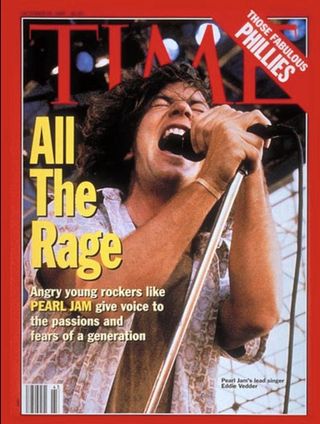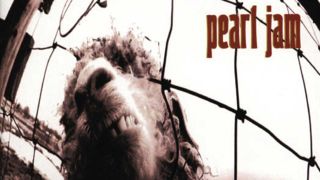In the summer of 1993 Time magazine approached the management companies looking after Nirvana and Pearl Jam with a proposal to put their artists on the cover of an autumn issue.
The magazine was keen to do a feature on the rise of ‘grunge’, the underground musical movement that exploded into the national consciousness from the moment, on January 11, 1992, that Nirvana’s Nevermind album toppled Michael Jackson’s Dangerous from the top of the US Billboard chart.
One week earlier, Pearl Jam had scored a minor chart success of their own, when their debut album Ten debuted on the Billboard 200 album chart at Number 155. This was hardly an achievement to warrant the popping of champagne corks, but it was nonetheless a significant moment for the Seattle band, demonstrating that four months on from its August 27, 1991 release, Ten still had legs. A further four months later, Ten passed the one million sales mark in America.
Then, in August 1992, MTV put Mark Pellington’s haunting video for Jeremy – based on the true story of 15-year-old Texan schoolboy Jeremy Wade Delle, who shot himself in front of his teacher and classmates – into rotation. At which point Ten began to sell at a rate out-stripping even Nevermind.
Mobbed whenever they appeared in public – “You couldn’t go anywhere without causing a scene,” recalled bassist Jeff Ament – the young musicians began to fret as to where their spontaneous, unselfconscious debut album might ultimately lead them. In a bid to slow down their dizzying ascent, Pearl Jam refused to let Epic release the ballad Black as a single, and asked for a time-out – no more interviews, no more photo shoots, no more videos. But the record's momentum could not be halted.
“When our record started to sell too, it was weird, and really stressful,” guitarist Stone Gossard told this writer. “Everybody was insecure and tense, it was such an odd time.
“For me personally the stress came from being huge but feeling like you were kinda crap. We couldn’t live up to the bands that we thought were the greatest. I don’t ever remember any thoughts like, ‘Wow, we’ve just made the best album ever.’ I just remember thinking that I was looking forward to making our next one.”
“We didn’t expect the record to be a huge deal,” Jeff Ament added. “But I guess it kinda became one.”
The release of new albums by both Pearl Jam and Nirvana in October 1993 certainly promised to be a huge deal. Though the two bands were often portrayed as bitter rivals in the media – a situation undoubtedly fuelled by snarky Kurt Cobain comments about what he perceived as Pearl Jam’s lack of punk rock credibility – the camps had recently been reconciled, with Cobain and Pearl Jam frontman Vedder even slow-dancing arm-in-arm at the 1992 MTV Awards: “I probably could have agreed with some of the things he said," Vedder later conceded.
“The only thing that bothered me about that [alleged rivalry] was because it was public, and people were reacting to it: it wasn’t like between us. There was a certain writer who pulled a quote of Jeff Ament’s out, and pulled a quote of Kurt’s out, and that made for interesting press. But really, I always felt like it us against the world, our town against the world, not our band against another band.”
And so, when they were approached by Time, the two groups took a bilateral decision not to participate in the magazine feature. Despite this, when the October 25, 1993 issue of Time hit news stands, it was Eddie Vedder’s face staring out from the cover, which hailed “angry young rockers like Pearl Jam” giving voice to “the passions and fears of a generation.”
“We’ve been swallowed up by the mainstream,” Vedder lamented. “No-one is going to want to listen to us.”
For once, Pearl Jam's thoughtful frontman called this wrong.

Pre-production for the band’s second album began in February 1993 in Seattle, switching to California the following month. Eighteen months on the road had solidified a unit which had only been in existence for six months when they recorded Ten, and the new songs largely developed from rehearsal room jams.
The sound was rawer, looser and more in-your-face, exactly what band leader Gossard - who considered Ten “over-thought, over-played and over-rocked” - wanted. Working with producer Brendan O’Brien for the first time, the quintet determined to capture this new-found aggression on the record.
With Vs. they achieved this and more.
From the opening riff of Go, the album has a ferocity and bite which leaves the more stately Ten in the dust, sounding like the work of a hardcore punk band rather than a classic rock outfit. On Animal Vedder established the idea of the quintet as a unit (“five against one”) and expressed his growing revulsion with disingenuous media attempts to co-opt his band’s aesthetic and ideas (“I’d rather be with an animal”)
There’s little let-up on this initial explosion of anger. The seething Daughter deals with child abuse, Glorified G attacks macho gun culture, W.M.A. is a scathing dissection of institutionalised racism and police brutality, while the more tender and melodic Elderly Woman Behind The Counter In A Small Town was a meditation upon feelings of entrapment and suffocation, which could be read as a metaphor for the band’s own sense of powerlessness as the machine around them grew.
That same notion was made even more explicit on Leash, with Vedder singing “We will find a way, we will find our place” then screaming “Get outta my fuckin’ face.”
“I will stare the sun down until my eyes go blind,” Vedder adds defiantly on closing track Indifference. “I won’t change direction, and I won’t change my mind.”
Lest anyone was still in any doubt, the title of the album too was a challenge, a declaration of independence and intent from a group hell-bent on self-determination, stubbornly refusing to buy into the game.
"For me, that title represented a lot of struggles that you go through trying to make a record," Gossard told Rolling Stone. "Your own independence - your own soul - versus everybody else's. In this band, and I think in rock in general the art of compromise is almost as important as the art of individual expression. You might have five great artists in the band, but if they can't compromise and work together, you don't have a great band... When I heard that lyric, it made a lot of sense to me."
The group refused to make a single video for the album, and interviews to promote it were vanishingly rare.
On the surface this stance didn’t immediately impact upon the band’s popularity - the week after Time magazine’s ‘grunge’ special was published, Vs., entered the Billboard chart at number 1, selling some 950, 378 copies in its first five days on sale, a sales record that would not be topped for five years.
But in wilfully taking a stand against the commercial forces of MTV, the mass media and, indeed, their own record label’s marketing plans, Pearl Jam would ultimately save their souls and ensure their continued relevance as a band.
An upraised middle finger of a record, Vs. still sounds as fierce and visceral today.


